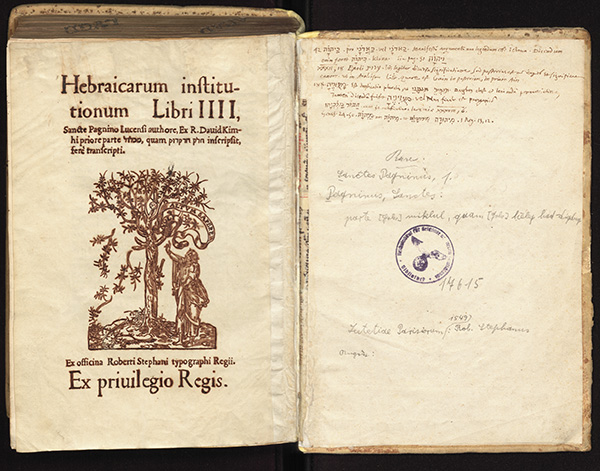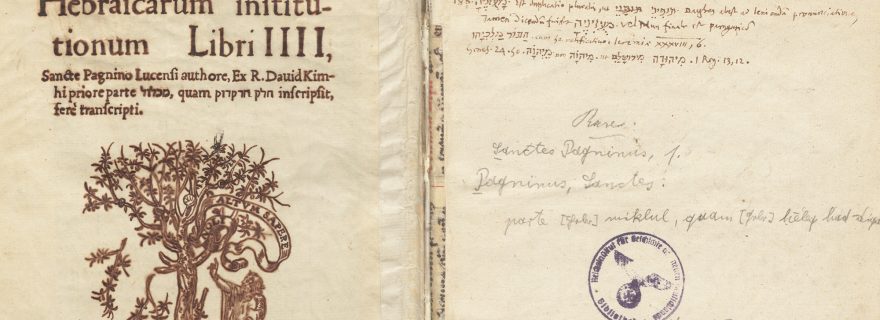War in the library
A copy of Santes Pagninos Hebraicarum institutionum libri IV (Paris, 1549) with a German ‘war past’
Libraries in Europe are still facing the problem of war booty and occasionally complicated issues around the restitution of books and works of art to their rightful owner(s). So, among the collections of Leiden University Libraries, under shelf-mark 873 D 15, we find a copy of Santes Pagninos Hebraicarum institutionum libri IV (Paris, 1549) with a German ‘war past’. The flyleaf is furnished with a stamp with eagle and swastika of the Bibliothek Reichsinstitut für Geschichte des neuen Deutschlands. The main purpose of this institute, which was established in 1935, was to occupy itself (by order of the NSDAP) with the so-called Judenfrage. Its members gave special attention to the historical research into the sources of anti-Semitism. The library of the Forschungsabteilung Judenfrage was established in München. How and why exactly this copy of Santes Pagnino landed in München and, later, was again returned to Leiden as yet remains unresolved.
As early as the end of 1940 Reichsarchivar Dr Bernard Vollmer came to Leiden with a proposal to carry old German heritage (this involved six manuscripts) from the University Library back to Germany. In the end, only one manuscript from Leiden, the Liber fundationis episcopatus Vratislaviensis (olim BPL 10) was swapped against the Egmond Chronicle from the Rehdiger collection at Breslau (BPL 2429). Later on the monastic archives of Emmerich and Neder-Elten (LTK 617) were simply robbed from the library. During 1941-1942 a couple of German librarians were the guests of the library where they had the bibliographic apparatus copied out for the purpose of ‘a new National Socialist library to be formed for the research of German mysticism and racial studies’. The copy of the Hebraicarum institutionum libri IV was probably taken or given along then.
When, in 1943, the severity of the bombardments of München increased, the library of the Reichsinstitut was packed in 238 crates and transported to Passau. After the war, the crates were returned to their rightful owners via the Allied Central Collecting Point in Offenbach. It must have been during these years that the Institutiones Hebraicarum were returned to Leiden, just as were the monastic archives.
Recently it was uncovered that the book – interestingly – was once the property of the well-known scholar Scaliger (1540-1609). To wit, the copy contains notes by his hand. Scaliger, who saw himself as a friend of the Jews, would undoubtedly have observed the threats to which this book was exposed with horror.




